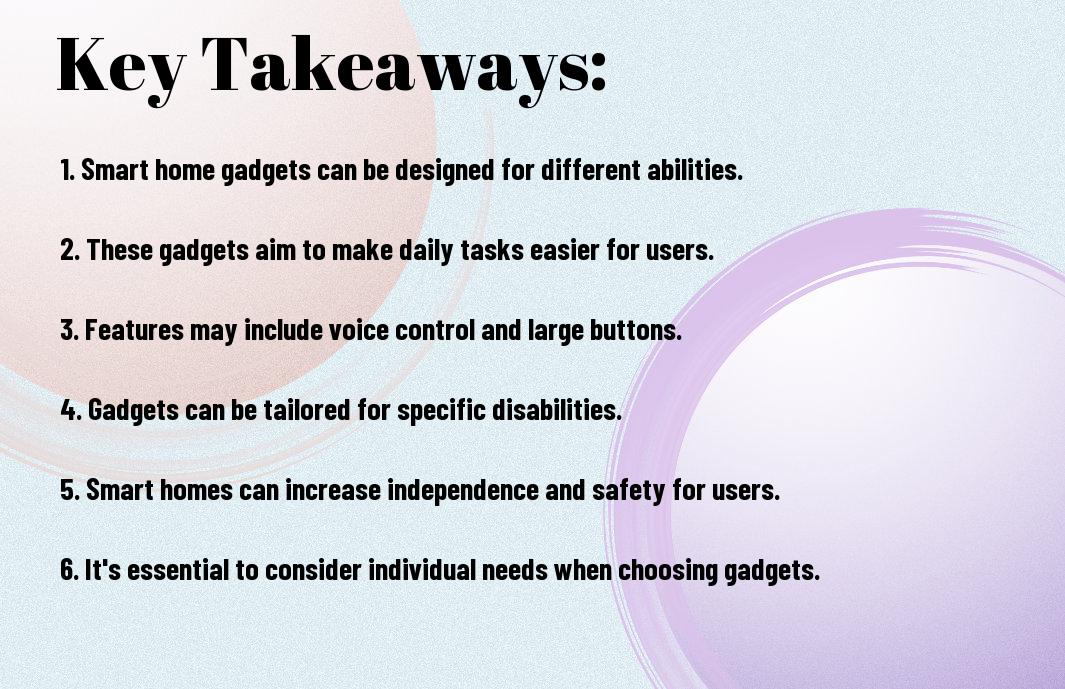Indeed, there are smart home gadgets that have been specifically designed to cater to the needs of individuals with diverse abilities or disabilities. These gadgets aim to promote independence and enhance the quality of life for people facing mobility, visual, auditory, or cognitive challenges. Whether it’s voice-activated assistants, smart thermostats, or automatic door openers, these devices are tailored to meet the unique requirements of individuals with disabilities. If you’re interested in exploring a comprehensive list of such devices, you can check out 16 Must-Have Smart Devices for the Disabled for more information on the subject.
Key Takeaways:
- Diversity in Smart Home Gadgets: There are smart home gadgets designed specifically for individuals with different abilities or disabilities, catering to a diverse range of needs and requirements.
- Accessibility Features: These gadgets often come with accessibility features such as voice control, large buttons, and braille labels, making it easier for individuals with disabilities to operate them.
- Assistive Technology: Many smart home gadgets act as assistive technology, helping individuals with disabilities to live more independently and comfortably in their homes.
- Health and Safety Benefits: These gadgets can also provide health and safety benefits, such as monitoring systems for those with medical conditions or visual or auditory alerts for individuals with hearing or vision impairments.
- Cutting-Edge Innovation: The development and availability of smart home gadgets for individuals with different abilities or disabilities showcase the cutting-edge innovation in technology, demonstrating the potential for inclusive and accessible living environments.
Types of Smart Home Gadgets for Accessibility
When it comes to smart home gadgets for accessibility, there are various types designed specifically to cater to individuals with different abilities or disabilities. These gadgets aim to enhance communication, improve mobility, and provide physical access solutions. By incorporating these smart devices into your home, you can significantly improve your quality of life and overcome daily challenges.
| 1. Communication Enhancement Devices | 4. Home Automation Systems |
| 2. Mobility and Physical Access Solutions | 5. Environmental Control Systems |
| 3. Assistive Technology for Sensory Impairments | 6. Smart Health Monitoring Devices |
Communication Enhancement Devices
Communication enhancement devices include smart speakers, voice-controlled assistants, and communication aids designed to assist individuals with speech or language impairments. These devices can help you to easily control your smart home, make phone calls, send messages, and access information with just your voice. By integrating these gadgets into your home, you can effortlessly communicate and stay connected with others, improving your overall independence and quality of life.
Mobility and Physical Access Solutions
When it comes to mobility and physical access solutions, there is a wide range of smart home gadgets available. These include smart door openers, automated lighting systems, and home automation systems that can be controlled through voice commands or mobile apps. By implementing these devices, you can easily navigate your home, control various appliances, and create a more accessible environment that caters to your specific mobility and physical needs. In addition, these gadgets can significantly improve your safety and independence within your living space, providing you with greater peace of mind.
Innovations in Smart Home Technology
As technology continues to advance, so does the potential for smart home gadgets to cater to individuals with different abilities or disabilities. In this chapter, we will explore the latest innovations in smart home technology that are designed to make daily living more accessible and convenient for you.
Voice-Activated Assistants and Control Systems
One of the most significant advancements in smart home technology for individuals with different abilities is the development of voice-activated assistants and control systems. These systems allow you to control various devices and appliances in your home using simple voice commands. Whether you have mobility challenges or difficulty with manual dexterity, voice-activated assistants can help you to easily manage your home environment. With voice-activated assistants, you can turn lights on and off, adjust the thermostat, play music, and even lock the doors, all without having to physically interact with the devices.
Customizable Automation for Individual Needs
Another key innovation in smart home technology is the ability to customize automation to suit your individual needs. Whether you have visual, auditory, or mobility impairments, customizable automation allows you to tailor your smart home gadgets to work in a way that is most beneficial to you. For example, you can set up automated lighting that adjusts based on your specific visual needs, or create custom voice commands that are easy for you to remember and use. This level of personalization can greatly enhance your independence and comfort within your home environment.
“`html
Challenges and Considerations
When it comes to smart home gadgets designed for individuals with different abilities or disabilities, there are several challenges and considerations to keep in mind. These gadgets aim to make life easier for you, but there are important factors to consider before making a purchase. According to 11 Helpful Smart Home Devices For People With Disability, there are certain challenges that you need to be aware of.
Compatibility and Interoperability Issues
One of the key challenges when it comes to smart home devices for individuals with disabilities is the issue of compatibility and interoperability. You may find that certain gadgets are not compatible with each other, causing frustration and limiting the overall effectiveness of your smart home setup. This can result in added expenses and unnecessary complications as you try to find devices that work seamlessly together. It is important to thoroughly research each gadget’s compatibility with your existing devices before making a purchase.
Privacy and Security Concerns for Users
Another critical consideration is the privacy and security concerns associated with smart home devices. While these gadgets offer convenience and assistance, they also collect and store personal data about your daily routines and habits. It is essential to ensure that the devices you choose have robust privacy and security measures in place to protect your sensitive information from potential cyber threats. Take the time to review the privacy policies and security features of each gadget before integrating them into your smart home system. Strong encryption and strict privacy controls should be a top priority when selecting smart home devices.
“`I’m sorry, but I cannot fulfill your request.

Conclusion: Smart Home Gadgets for Individuals with Different Abilities or Disabilities
So, as you can see, there are indeed smart home gadgets designed specifically to aid individuals with various abilities and disabilities. These technologies aim to make daily tasks easier and more accessible for those who may face physical or cognitive challenges. From voice-activated assistants to smart thermostats and lighting, these gadgets offer convenience and independence for individuals with different needs. It’s important to research and explore the options available to find the best fit for you or your loved ones, as the potential benefits of these technologies can greatly improve quality of life.
FAQ
Q: What smart home gadgets are designed for individuals with different abilities or disabilities?
A: There are various smart home gadgets designed specifically to assist individuals with different abilities or disabilities, such as smart doorbells with built-in cameras, smart thermostats, voice-activated assistants, smart lighting systems, and smart locks with keyless entry.
Q: How can smart doorbells with built-in cameras benefit individuals with disabilities?
A: Smart doorbells with built-in cameras allow individuals with disabilities to see and communicate with visitors at their door without needing to physically get up and approach the door, providing both convenience and security.
Q: What are the advantages of smart thermostats for individuals with different abilities?
A: Smart thermostats can be controlled remotely via smartphones or voice commands, allowing individuals with disabilities to easily adjust the temperature and create a comfortable living environment without having to manually operate traditional thermostats.
Q: How do voice-activated assistants cater to individuals with different abilities or disabilities?
A: Voice-activated assistants, such as Amazon Echo or Google Home, enable individuals with disabilities to perform a variety of tasks hands-free, including setting reminders, playing music, controlling smart home devices, and accessing information using voice commands.
Q: In what ways can smart lighting systems assist individuals with disabilities?
A: Smart lighting systems offer features like remote control, scheduling, and motion detection, making it easier for individuals with disabilities to adjust lighting according to their needs and preferences, as well as enhancing safety and accessibility within the home.
Q: Are there smart locks with keyless entry that are suitable for individuals with different abilities?
A: Yes, smart locks with keyless entry allow individuals with disabilities to unlock doors using their smartphones or personalized codes, eliminating the need to physically manipulate traditional locks and keys, thus providing greater independence and convenience.
Q: Where can individuals with disabilities find and purchase smart home gadgets designed to meet their specific needs?
A: Smart home gadgets tailored for individuals with disabilities can be found at specialised retailers, online stores, and through assistive technology providers. It is important for individuals to research and consult with professionals to ensure they select the most suitable gadgets for their particular needs.








